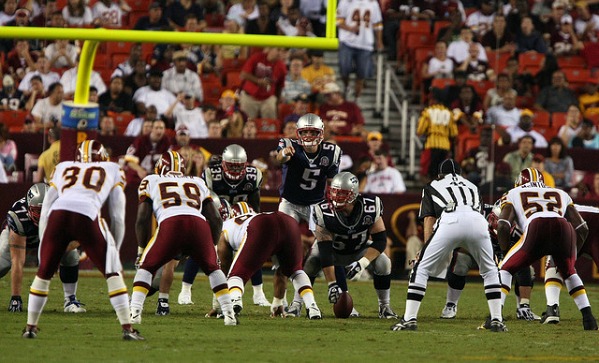It ought to make for a good matchup, all this back and forth. Coming off the AFC finals two weeks ago, the New England Patriots were favoured to win this Sunday’s Super Bowl. They’d left the regular season with a 13 – 3 record, routed the much-hyped Broncos in the division final, and squeaked passed the Ravens to win the conference.
Against the Broncos, the Patriots really did seem unbeatable; Tom Brady slaughtered records and made short work of the opposition (though there wasn’t very much of one to begin with). But that shaky win against the Ravens, and the fact that there was a string of victories over lack-lustre competitors before that, translates to doubt. All things considered, the Patriots haven’t proven much leading into this championship.
At the opposite end of Sunday’s Super Bowl field, the Giants are on a month-long hot streak, including a clinical finish over the Falcons, a victory over the top-seeded Packers and an overtime win against the 49ers. They are now favoured to win Super Bowl XLVI.
The Giants are also coming to a pivotal moment in their history. In 2008, they “fluked” the perfect Patriots in the Super Bowl, and have made the playoffs twice since, including this season. This is the upswing of a possible dynasty: a point at which a team can prove, for once, that it is not simply beating the odds, but playing at the top its game. The Patriots are straddling that same high point, and must to prove their mettle in the downward slump of their dynasty days.
The term underdog was first used in 19th century dog fighting, to describe the losing dog at the end of the fight — literally, the one that wound up under the top dog. Eventually the term was embraced in point spreads and betting odds, where favourites are picked to win and underdogs expected to lose. To bet on losing odds, one actually bets against the team they want to see win.
They’re funny, these semantics. But there is a psychological slant to them, as well as a mental advantage attached to those underdogs — because the top dogs still fear their bite. Imagine this fear and anxiety fueled by adrenaline in the body of a pro football player. The underdog can better concentrate knowing this kind of pressure is on the frontrunner, not him.
What’s interesting about this year’s Super Bowl is that a bit of top dog and underdog exists on both sides of the field. Each team has something to prove. The Patriots need to convince everyone, possibly including themselves, that they’re not just there because of an easy run; that their defence can meet a strong offence; their offence, a strong defence. The Giants need to show they’re no longer an underdog, that 2008 was no mistake.
Which struggle is worth more?
The answer, paradoxically, is the struggle of the Patriots. The upswing of support for the Giants — both on the books and in the papers — shadows the Patriots’ long-held position at the top of most minds. The belief that the underdog needs to outwork the top dog in order to succeed doesn’t work here: It’s an exception to the rule. A team can’t be the underdog if it’s favoured to beat a famed opposition, as the Giants are: They’ve shrugged off the underdog yoke, and now the Patriots have to answer the challenge. If the Patriots lose, it could be the beginning of a downward spiral.
Still, this kind of eleventh-hour restacking of odds is the stuff of legend, particularly in football, where dynasties regularly rise and fall. It’s the reasoning behind such clichés as “Any given Sunday” — one that will most certainly hold true this weekend.
———————
Image courtesy of Keith Allison.


